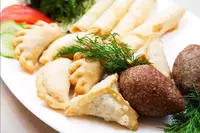The lebanese

Lebanese cuisine is rightly considered the most popular of all the cuisines in the Middle East. Thanks to the rich history of its country, it is quite diverse and has pronounced features. Many Lebanese recipes have gained worldwide popularity and are rightfully classified as healthy food.
Having visited a feast in Lebanon, you will undoubtedly be amazed by the variety and number of dishes that are intended for one table. However, despite the culinary abundance, it is difficult to meet at least one fat person in this country, since the main rule of local foodies is moderation.
It is worth noting that the national Lebanese cuisine was born quite gradually. After each new conqueror, a new trade route, Lebanon was enriched with recipes from many countries of the world. In the process of preparing Lebanese cuisine, local chefs have been using a wide variety of seasonings, spices, fragrant herbs, vegetables and grains from time immemorial.
Lebanon's cuisine includes a huge variety of legumes, fruit, fresh fish and seafood. Poultry, by the way, is consumed much more often than red meat, which is represented by lamb or goat. A typical taste that fully reveals the concept of this cuisine is a mixture of olive oil, herbs, garlic and lemon juice. Almost all Lebanese dishes are prepared using this oil: many products are baked, fried or stewed with it.
As in Cyprus in Lebanon, there is such a concept as meze, with the only difference that the number of dishes served is reduced to ten. A fairly dense snack is followed by up to five main courses, which are accompanied by numerous vegetables. And the guest will never be released from the table without sweets, which are usually treated at the end of the feast.
During lunch, all meals are served on the table on large common dishes and each person superimposes as much as he sees fit. No one will look at you askance if the portion you are supposed to have is large enough - the friends at the table are more important than the food itself. Perhaps that is why Lebanese hospitality in the Middle East is recognized as a standard.
Lebanon's sweets and desserts deserve a separate conversation. By the way, recipes for Lebanese cuisine that concern sweets are known far beyond the borders of the country. Fabulous oriental delights just melt in the mouth like honey. There are more than 10 species of baklava alone, and they make it from fresh dough, adding pine nuts, almonds and pistachios. Due to the very high sugar content, such sweets can persist for months. During numerous religious fasts, these plant-based nutritious foods help Muslims maintain strength. After the end of the fast, the Lebanese allow themselves to enjoy excellent local wine, but they never get drunk.
According to food and drinking rituals, drinks and the culture of their consumption, you can easily make a general impression about your place of stay, as well as about those people with whom you happened to communicate. Therefore, it becomes obvious that Lebanon is an extremely hospitable country, where people eat to work, but work in order to live with dignity.
 Español
Español Français
Français Português
Português Русский
Русский 简体中文
简体中文 繁體中文
繁體中文 日本語
日本語 한국어
한국어 العربية
العربية Türkçe
Türkçe Қазақ
Қазақ Deutsch
Deutsch Italiano
Italiano Українська
Українська
